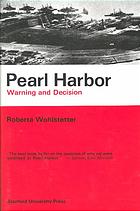Session 22
ORGANIZATIONAL CULTURE; PROs AND CONs
ORGANIZATIONAL CULTURE PLAYED KEY ROLES IN TWO EVENTS OF THE 20TH CENTURY,
SEPARATED BY 21 YEARS, WE'LL DO THEM CHRONOLOGICALLY.
Today, Eightfold will lead us in a consideration of 1941
"... the mechanism by which intelligence "signals" are sorted from background "noise" are neither uniform, entirely rational or random, but are instead functions of the culture and identity of the analytic unit"
ONE OF TWO CLASSIC STUDIES OF THE ROLE OF ORGANIZATIONAL CULTURE IN DECISION MAKING

Read part of Roberta Wohlstetter's take on 1941
Wohlstetter, R. (1962).
Pearl Harbor; warning and decision.
Stanford, Calif: Stanford University Press
read pages vii-ix and 382-401
First of all, it is much easier after the event to sort the relevant from the irrelevant signals. After the event, of course, signal is always crystal clear; we can now see what disaster it was signalling, since the disaster has occurred. But before the event it is obscure and pregnant with conflicting meanings.top
consider the decisions made under conditions of uncertainty in this situation
Read Saving 'Boxer 22'
Is there anything to learn about how organizational memories are born and transmitted?
topTHINGS WE'LL TALK ABOUT
- using Wohlstetter as an examples, we'll reflect on the benefits and disadvantages of organizational culture
- why is an organizational culture necessary?
- does it help organizations orient their goals and prioritize?
- does it make organizations vulnerable to stagnation?
- think of companies and organizations that refused to change their organizational culture and suffered as a result
SOMETHING TO TAKE AWAY
La Mer
"La Mer" (English: "The Sea") is a song credited to French composer, lyricist, singer and showman Charles Trenet. The song was first recorded by the French singer Roland Gerbeau in 1945. It was not until 1946 that Trenet recorded his own version. When it was released in 1946, it became an unexpected hit, and has remained a chanson classic and jazz standard ever since.
Last Updated on | Copyright © R.E. Bergquist 2014- | Powered by w3.css